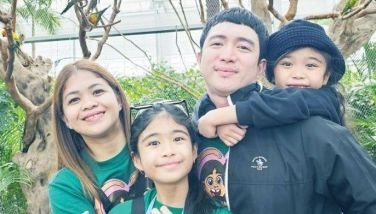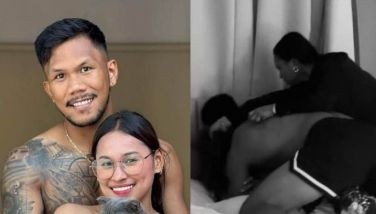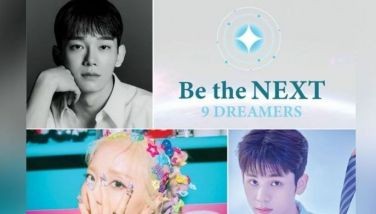The Ghost of Gandhi conversations

LONDON — I am rubbing my eyes, blinking and blinking, and I still see the great Indian icon Mahatma Gandhi in front of me. He seems so alive, so very real, that I am tempted to pinch him to find out if he’s really here with me.
I rub my eyes and blink again. Sure enough, it’s only the make-believe Gandhi talking to me in a manner he does when he’s onstage (playing Shakespearean characters) or in movies (playing characters just as heavy and demanding) — yes, Ben Kingsley who plays the title role in Gandhi and won an Oscar Best Actor for it in 1982!
He fills a function room (converted into a taping room) of the posh The Dorchester with his presence so magnetic that it overwhelms you, rendering you almost powerless. Thank heavens that Kingsley is an engaging man, connecting to you in the same effective way he grabs you with his powerful screen personas. He talks as if he’s not just conversing with you but fleshing out a challenging theater/film character.
Topic of the day: Walt Disney Pictures’ Prince of Persia: The Sands of Time, produced by the smash-hit-maker Jerry Bruckheimer (the Pirates of the Caribbean trilogy, etc.) based upon the video game, with Jake Gyllenhaal in the title role (subject of last Sunday’s Conversations). Kingsley plays the villainous adoptive father of Gyllenhaal’s Dastan character.
A brief backgrounder: Ben Kingsley was born Krishna Pandit Bhanji on Dec. 31, 1943 in Snainton, Scarborough, Yorkshire, England, to Rahimtulla Harji Bhanji, a medical doctor, and Anna Lyna Mary (nee Goodman), an actress and model. He was educated at Manchester Grammar School, an independent school in Manchester in northwest England, where one of his classmates was actor Robert Powell. He then studied at the University of Salford and at Pendleton College which later became home to the Ben Kingsley Theater.
“I visited the Philippines a long time ago when we premiered Gandhi,” he tells me. “It was a wonderful visit, a very exciting visit. I haven’t been there since but I loved it there. I hope that the Philippine population will really enjoy Prince of Persia; I’m sure they will.”
What does he remember from that visit?
“I remember the beautiful churches.”
Gandhi was shown in 1982 and people still remember you for it even if you’ve done other landmark roles. How do you feel about that?
“I think that it’s not a question of being remembered as, because as you well know that film is shown every year, over and over again, it’s available on DVD, it’s available on video, it’s shown in schools all over the world...it’s a film that I’m tremendously proud of. So it’s not an old movie in that sense; it’s a current film. Alongside everything else that I do, I’m privileged to still be able to have my work seen by people who were born way after Gandhi was made, who are seeing it on DVD, pay-per-view or rental TV, so it’s a new film and a new experience to them.”
Is doing Prince of Persia a breeze compared to your other roles which are “heavy’?
“As you must have known from what Jerry, Jake, Mike Newell (the director) and Gemma (Arterton as the mysterious princess who helps Jake’s character fight the dark forces) have said, what will make this film a success is the amount of energy that the actors have invested in their characters. Therefore, it’s a character-driven piece, and as soon as I get that kind of role I work at it with exactly the same discipline and dedication I give to everything else that I do. I take my work very seriously, so nothing is a breeze.”
What factors do you consider in accepting a role?
“What I can bring to it in the sense of recognizing a part of human behavior. I have to bring something to it and I think the first step in bringing something to a portrait is an empathy with the person you are portraying...an understanding...it’s like a secret pact between you and your character. So that when I’m reading a script, if I hear that little voice in my head that says to the character, ‘I know your tricks, I know what you are up to and I will show the audience what you are up to,’ then I will accept the role.”
Any other real-life person you would like to portray?
“I was in Vienna for a film that I didn’t enjoy making. I wasn’t happy on the set. I went back to my trailer and there was a photograph of this very distinguished-looking man on my table. I flipped it over and there was a note at the back, ‘You should meet this man.’ I flipped it back and showed it to my colleague who came to my trailer, ‘Who’s this?’ And he said, ‘My God, that’s Simon Wiesenthal!’ (Wiesenthal was an Austrian-Jewish architectural-engineer who survived the Holocaust. He died in 2005. — RFL) A year later, Simon phoned me in my house and said, ‘HBO is making a wonderful film of my life called Murderers Among Us (The Story of Simon Wiesenthal, 1988) and I would like you to portray me.’ I read the script and I realized that my intuition married very closely to Simon’s most famous psychological gesture. When we met, I told Simon, ‘I know your tricks, I know what drives you, I know your demons,’ and his demons were ‘Why me, why did I survive?’ He was a wonderful man.”
And what did you find interesting about Nizam, your character in Prince of Persia?
“Because of my work on Shakespeare, playing great Shakespearean giants of character like Iago in Othello and Brutus in Julius Caesar...men driven by envy and regret...I love playing Nizam, a character driven also by envy and regret. He saves the life of his brother (the adoptive king-father of Gyllenhaal’s character Dastan) so he cannot bear the thought of Dastan becoming a prince. I play the bad guy. It’s so beautiful. What a difference! What appealed to me about the story is the notion that everybody has great potential, and this is where I thought it would be a very affirming film, particularly for young people...to realize that while you might be a child of the streets as the Dastan character is, it doesn’t mean that your potential is any less than that of a child from the palace. The boy Dastan remembers my Nizam character as the uncle who picked him up from the street and I remember him as a piece of s--t. This film is an examination of the potential of a child coming into adulthood and the choices he has.”
Which gives you more fulfillment, theater or film?
“I’m a film producer and I love cinema. I’ve been steeped in cinema for 30 years. I’ve done several plays but I’m not a man of theater at all but my training was in the theater, so I always have that as the backbone of my work in film. But I’m completely cinema now. And I love it.”
You play different roles that break barriers (read: not typecast as Indian and/or Asian) — the title role in Silas Marner: The Waver of Raveloe, a US vice president in Dave, the title role in Moses, Otto Frank in Anne Frank: The Whole Story, Fagin in Roman Polanski’s Oliver Twist and as the title role in the telemovie The Tale of Sweeney Todd, to name a few.) Would you then consider yourself multi-racial?
“I consider myself profoundly English but then the English are all over the place. My father’s father left India in the 1890s and went to East Africa. He sent my father to the United Kingdom at age 14 to study there. My mother, who’s half-Jewish and half-English, was the daughter of an American father whom she never knew...he just disappeared! As an actor, I love being claimed by the Iranian family and the Persian family in a shopping mall now that I’m appearing in Prince of Persia, and they’re asking me, ‘How did you know about our dad?’ So yes, I can be multi-racial in a sense.”
I presume that you saw Slumdog Millionaire (2008 Oscar Best Picture). Do you think it shows India in the right perspective?
“Yes, I think it’s a very responsible film. I have visited India many times, the last one quite recently, and I find it a bustling environment. People living in the slums side by side with high-rise air-conditioned apartments in Bombay is part of the conundrum that is India. The stark contrast reminds me of Rio de Janeiro.”
What will make you go back to India and make a movie there, perhaps a Bollywood movie?
“I wouldn’t do a Bollywood movie and I’ve made that absolutely clear.”
Why not?
“Because I have better things to do.”
Really now?
“I’m going to make a film about the building of the Taj Mahal and I will play Saj Jahan who built the Taj Mahal for his beloved wife to rest in peace. I’m producing it and starring in it.”
By the way, is it true that Ringo Starr and John Lennon came up to you and said that you should be a musician?
“No, they didn’t come up to me; I went up to them. I did a play called Smashing Day in the West End for which I wrote the songs; I was the musical narrator. We came onstage and between scenes I played my guitar and sang very plaintive songs about the lonely life. At the end of the play, Brian Epstein who managed the four lovely guys (The Beatles) introduced me to John and Ringo who told me that I did very well with my songs on my guitar and said that I should meet their recording manager. I did meet him and he promised to make me a rock star, but then Shakespeare came knocking on my door and I chose Shakespeare.”
Would you still like to be a rock star? It’s never too late.
“I still use my musical ear for the accents and rhythm of the men I’m allowed to inhabit. I always use rhythm and tone, very much so in Shutter Island in which I play a doctor dealing with a very volatile and dangerous patient (played by Leonardo DiCaprio). As a doctor, my tone of voice has to be precise because I knew that this guy could go berserk at any second as he’s coming off drugs. So I thank the musicality of Shakespeare for that.”
How would you like the idea of doing a musical (singing) role?
“I would love to. I recorded The King & I with Julie Andrews. That was the last time I sang on record and it was a wonderful experience.”
(E-mail reactions at [email protected] or at [email protected])
- Latest
- Trending

































